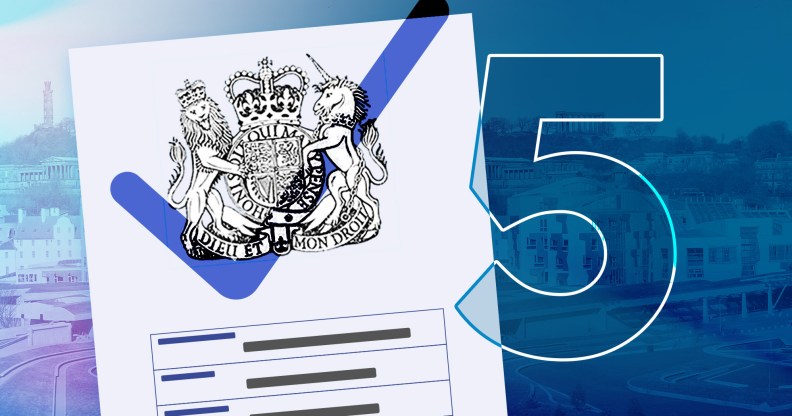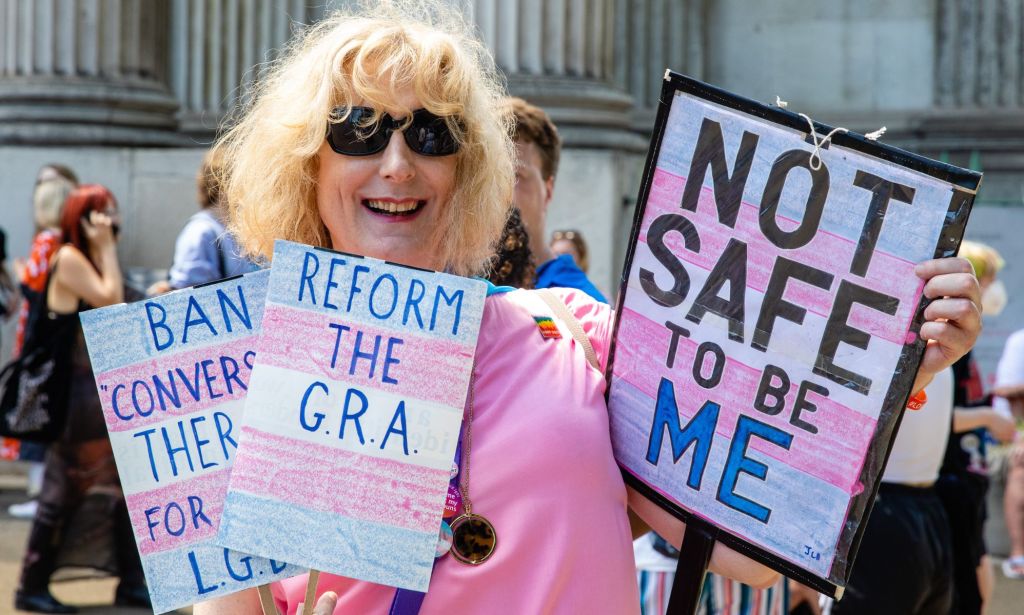Five massive lies about Gender Recognition Certificates for trans people, debunked

The Gender Recognition Certificate allows trans people to use the correct title on legal documents and certificates. (Getty Images)
A number of lies about gender recognition certificates (GRCs) have plagued Scottish reform discussions over the past few months – and, indeed, every discussion around the subject.
The Scottish reforms – which passed in a December vote of 86-39 – amend the Gender Recognition Act (GRA) in Scotland to make it easier for trans people to legally recognise their identified gender.
The changes involve the removal of medical requirements, lowering the age limit from 18 to 16, and cutting the period that an applicant must live as their required gender from two years to a few months.
But, several months following the vote, the UK government announced on Monday (16 January) that it would block the reforms from passing.
Anti-trans pundits have taken the chance to use discussion around the bill as a way to spread misinformation about its clauses – and it’s all the same lines we’ve heard time and time again.
Some have claimed that GRCs can affect women’s rights, while others have spread blatantly false claims that they somehow increase violence against women.
All of these are untrue and often derive from rhetoric that aims to misgender trans individuals and reject their identified gender.
Here are just a few of the dangerous lies pushed about the Gender Recognition Act debunked and clarified.
‘It allows trans people to access single-sex space’
Legally recognising an individual’s gender identity does not affect their ability to access single-sex spaces – there are no GRC scanners in public bathrooms.
The gender recognition certificate is simply a document that allows trans people to use the correct title on legal documents and certificates.
Once obtained, an individual will be able to get married using their identified title, have an accurate death certificate, and is one of the ways to obtain a correctly gendered passport.
Nothing about a GRC changes a trans person’s fundamental right to use a space dedicated to the gender they identify with.
‘Scotland’s Gender Recognition Act Reforms would have affected the 2010 Equality Act’

The Gender Recognition Act has no bearing on the clauses or conditions of the 2010 Equality Act, because trans people are already a protected characteristic.
Section seven of the Equality Act states that trans people are protected, meaning that discrimination on the basis of gender identity is unlawful – this includes within the use of single-sex spaces.
Scotland’s GRA reforms not only fall outside of this rule – relating to the specifics of gender recognition rather than its protection – there are clauses within the bill to prevent it from affecting the legislation.
Clause 15A of the Scotland Gender Recognition Reform states: “For the avoidance of doubt, nothing in this Act modified the Equality Act 2010.”
‘Gender recognition certificates are readily and easily available in the UK’
GRCs are unnecessarily difficult to obtain in the UK compared to the systems of other countries that offer them.
Obtaining legal recognition of your gender identity involves multiple legal documents, evidence that you’ve lived as your affirmed gender for two years, approval of a medical panel, and consent from a spouse, if applicable.
A gender dysphoria diagnosis from a medical professional is also encouraged, though not required. Those who apply without a diagnosis must wait six years presenting as their gender before applying, however.
These steps make applying for a GRC incredibly cumbersome and often debilitatingly difficult.
Additionally, non-binary gender markers are impossible to get in the UK at the time of writing.
‘Barriers need to be in place so that people don’t make a decision they will regret’

A Gender Recognition Certificate is a big step for most people – it is not, however, an irreversible step.
Accepting the reversal of an acknowledged GRC takes significantly less effort than applying for one, to begin with, and does not include the unreasonably long waiting period.
Those looking to overturn their GRC require consent from a medical professional and their original birth certificate, as well as a name change if required.
In fact, self-ID would actually make this process even easier and allow applicants to change their gender markers much more easily.
The idea that trans people looking to recognise their own gender should be chastised for making a decision they may regret is disingenuous because it implies that adult trans people are not in control of their own decision-making.
‘Easier access to Gender Recognition Certificates poses a threat to women’s safety’
Pushing aside the underlying transphobic rhetoric to this claim – this is not the case and never has been.
Violence against women is tragically incredibly high in the UK, with at least one in four women having been raped or sexually assaulted as an adult.
Of these statistics, there is no evidence to suggest that Gender Recognition Certificates aided abusers or were used to further the cause of a crime.
The frighteningly high epidemic of abuse against women and girls is evidence that GRCs provide no benefit to abusers whatsoever.
Not only do GRCs not provide access to single-sex spaces, but previously reported cases also show that abusers don’t need explicit legal permission to invade those spaces in order to assault someone.
How did this story make you feel?

